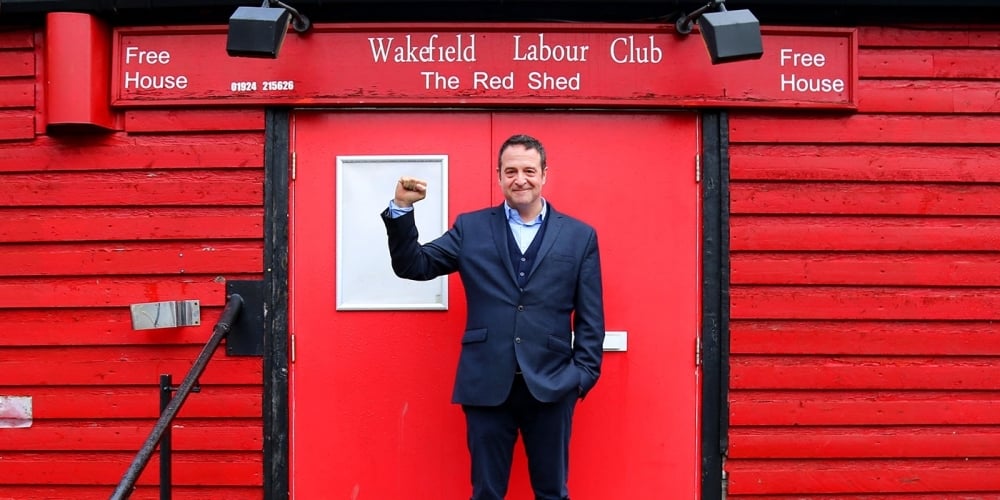 Wakefield Labour Club, aka The Red Shed, is currently celebrating its golden jubilee, no mean feat for a seemingly insignificant wooden edifice standing in the shadow of a local department store. It also happens to be the first place Mark Thomas performed live more than three decades ago and, to commemorate these facts, the London-born comedian cum agitator is back in Yorkshire to pay his respects to the place where he first cut his teeth with a trio of dates at Leeds West Yorkshire Playhouse on 2, 3, and 4 November, followed by a brace at Halifax’s Square Chapel on 9 December.
Wakefield Labour Club, aka The Red Shed, is currently celebrating its golden jubilee, no mean feat for a seemingly insignificant wooden edifice standing in the shadow of a local department store. It also happens to be the first place Mark Thomas performed live more than three decades ago and, to commemorate these facts, the London-born comedian cum agitator is back in Yorkshire to pay his respects to the place where he first cut his teeth with a trio of dates at Leeds West Yorkshire Playhouse on 2, 3, and 4 November, followed by a brace at Halifax’s Square Chapel on 9 December.
Having studied at Bretton Hall, Thomas maintains a real connection with West Yorkshire and, ahead of his nationwide tour. He kindly shares his thoughts on his new stage venture, firstly paying tribute to The Red Shed, a venue with which he has kept in touch during the intervening years. “It’s a fantastic place I’m very lucky to have been part of, and sort of grown up politically in. It’s a 47 foot long wooden shed and 50 years old this year, an incredible story and metaphor for radical politics of the left that this place survives. The Shed is the first venue where I did public performances and we’re not talking stand up, it was just me and my mates performing this weird little political theatre. We’d write the show in the afternoon and put it on in the evening. Throughout my career I’ve gone backwards and forwards to The Red Shed: performed there, worked there, done gigs there and broadcast from there.”
Mark is also keen to heap praise on the Leeds theatre, enthusing “West Yorkshire Playhouse have been absolutely solid in their support of this, and have gone beyond the call of duty, helping us with performance spaces, rehearsals, technical stuff, advice and mentoring, whilst realising this is an important story for Yorkshire. There is a real effort to do Yorkshire stories, whether it’s Barnbow Canaries, Kes or Damned United, nice to see a theatre say ‘We’re going to work for our community.’ That’s really exciting and to be part of that is thrilling.”
Unsurprisingly the region’s pivotal industrial dispute is the central theme of The Red Shed, Mark corroborating “The story we’re concentrating on takes place on the last day of the miners’ strike when they marched back to work. I was invited to one. I can’t remember the name of the pit, village, or who invited me but what I do remember is marching past a primary school and the children singing ‘Solidarity Forever’ in the playground for the miners. It was incredibly moving and I’d never realised at the time how important that memory was [to me]. It was only years later when being interviewed by a journalist about where my politics came from that I remembered the event.”
Naturally after all these years, it’s been important for Thomas to retrace his steps and fill in the blanks. “In this post factual world where narratives and stories are more important than the truth, it’s no use pointing at others without providing a real alternative, so I had to find the pit village and children to find out if my story was true, and that is basically the show, me and my mates going back to The Red Shed and trying to find those children from the school. We have recordings of my mates. We have their stories, real things and real people underlining the reality of it. In all the shows I do, I try and document what happens so people can see these stories are true. When we did Bravo Figaro I interviewed my mum and dad, when we did Cuckooed, we had conversations with my friends, and showed legal documents on massive screens to make sure the people knew it was true.”
Mark elaborates further on The Red Shed’s broader themes. “The show is also about how has this country got to the point it has, and how communities have been treated—a story about us, about Britain, about working class identity and belief, about [real] stories and narratives. It was a very shocking time and it formed this nation, the relationships the state has with trade unions, working people, with history, the way in which people can be treated—people frightened to have a toilet break in case they get sanctioned. All of this is a result of the miner’s strike, it wouldn’t have happened without Thatcher winning.”
The Red Shed also played a vital part during the Miners’ Strike, Thomas substantiating “There were 150 miners in Wakefield without the support and the network of interdependents that there was in the pit villages. The Shed became really important for supporting those miners through the strike, making sure those families were fed, had a good Christmas, getting the help they needed and deserved.”
Mark also did his bit too, though three decades on, he still questions the value of his work, humility and self-deprecation all too evident although given the circumstances at the time, I’m sure he’s being a little hard on himself. “Me and my mates used to perform in soup kitchens during the miners’ strike. It’s grim enough you’ve got to eat in a soup kitchen without some patronising bastard like me going ‘I’m here to entertain you with some social realism.’”
The Red Shed also features lots of audience participation, “For me the show doesn’t work unless people join in, helping me on stage, doing stuff, singing along, doing noises. It’s a collective act, the audience an important part in the telling of the story. I was really clear we wanted to make a show that was about the collective, about all of us. We’ve just had the most incredible reactions to the stories, in Glasgow it just took the roof off, we had people from mining villages and afterwards it was so fucking emotional, this woman came up to me and said ‘You’ve told my story’. It’s a fantastic thing because working class stories and working class struggle are forgotten and now more than ever they need to be remembered. There was a time the working class believed they could change the world for the better for everyone through their own actions, by themselves, not by the actions of a group of politicians but by trade unions and working class movements. It’s really interesting how working class always aspire, always have that sense of self-improvement and community improvement which I think is really important.”
Despite the themes of struggle and adversity we also have green shoots of hope as Thomas talks about his crusade to unionise the fast food industry. “The campaign involves the Bakers Union, Unite and the GMB. Before there were industries where people were physically in contact with each other, physically worked in one place and physically worked for a single employer, and in those circumstances you can unionise. Now we’ve a fractured workforce, and what’s interesting is that people are beginning to unionise and work around that. You’ve got London cinema workers unionising and beginning to fight, look at the formation of a union and a strike in Deliveroo, which was just outstanding. In Featherstone, there are [striking school] cleaners that suddenly find themselves academized, the services are put out to tender and the first thing they do is cut the fucking pay. In Glasgow you’ve had the janitors strike across the city…..all these different things show the mobilising of this new atomised, disenfranchised working class and when you look at the fast food industry, actually there is a cause for hope, very cautions but hope nonetheless.
Tickets are selling fast. Catch one if you can: http://www.markthomasinfo.co.uk.
Filed under: Comedy, Theatre & Dance
Tagged with: comedy, interview, Mark Thomas, preview, Square Chapel Halifax, The Red Shed, theatre, West Yorkshire Playhouse, yorkshire



Comments